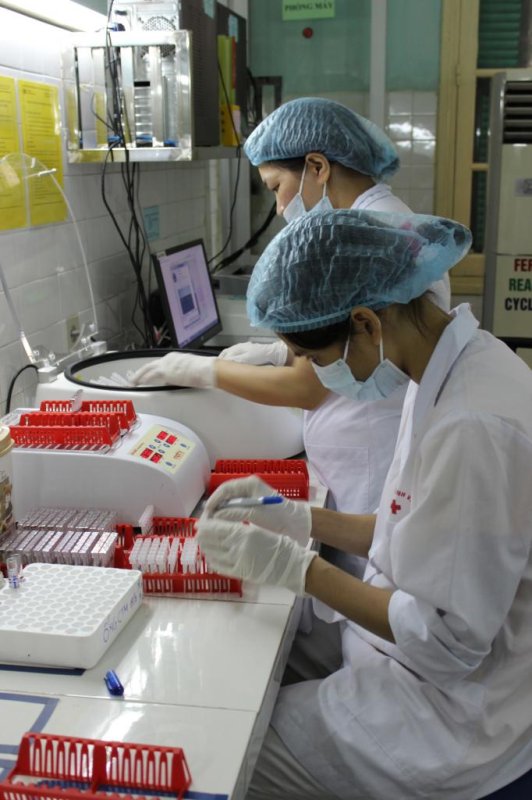CDC experts provided training and standardized protocols to enhance Vietnam’s ability to confirm detection of new pathogens such as influenza A (H7N9) and MERS-coronavirus (MERS-CoV).
CDC Photo by Niki Pham
ATLANTA, May 17 (UPI) -- An Illinois business associate of the man who was the first confirmed case of Middle East Respiratory Syndrome in the United States tested positive for the disease, but only had mild cold symptoms.
An American citizen whose name has not been made public works as a healthcare provider in Saudi Arabia. He was the first confirmed case of MERS in the United States. He took a plane April 24 from Riyadh, Saudi Arabia, to London, then to Chicago and then he took a bus to Munster, Ind. In late April, the man went to Community Hospital in Munster, Ind., with a fever, cough and shortness of breath.
There are no specific treatments recommended for the MERS coronavirus and no vaccine. The Indiana man improved and was released to home isolation. As of Friday, there have been 572 laboratory-confirmed cases of MERS in 15 countries and 173 patients died.
Dr. David Swerdlow, incident manager for MERS-CoV response activities; and associate director for science in Centers for Disease Control's National Center for Immunization and Respiratory Diseases, said the Illinois resident tested positive for the disease but technically he doesn't count as a third U.S. case of MERS.
"The Illinois man is not considered an official MERS case under the World Health Organization definition," Swerdlow told reporters during a telephone news conference.
"The WHO definition of a MERS-CoV case is to test positive for the PCR test -- polymerase chain reaction that amplifies the viral genetic material to a level that can be detected -- which detects the active virus. The Illinois man tested positive for a blood test that showed exposure to MERS and the development of antibodies to the virus. Both types of tests were given to those with prolonged contact with the Indiana patient."
None tested positive for active MERS, Swerdlow said.
The Illinois resident, who identity has not been made public, had mild cold symptoms but they might have occurred after the 14-day MERS incubation period -- it could have been a mild cold or allergies -- but he did not feel unwell enough to see a doctor and is feeling healthy. He has been in self isolation -- meaning he is staying home and away from people and wearing a mask if in contact with people, Swerdlow said.
The Illinois man had no previous travel and was likely exposed to MERS from the patient in Indiana, Swerdlow said.
"The Indiana man drove a car from Munster to a location in Illinois not being made public. He met with the Illinois man twice and one meeting involved face-to-face contact for as long as 40 minutes," Swerdlow said.
The Indiana patient said he had a fever during the lengthy business meeting and he was not feeling well, but he said he did not have respiratory symptoms. He shook hands with the Illinois man but they did not hug, Swerdlow said.
When MERS was first reported, people were sick right away, but at least 20 percent have not had any symptoms -- so it is not surprising to find someone asymptomatic, Swerdlow said. Health officials do not know how the virus is transmitted.
"It's not sustained transmission and it's not easy transmission," Swerdlow added.
The MERS virus does not appear to spread easily from person to person, but in other countries it has spread to family members and to healthcare workers who treated patients with the virus.
The CDC, state and local health officials said they have identified people with prolonged contact with the first MERS case in Indiana. Hospital staff, who had direct contact with the patient, prior to the patient being placed in full isolation were taken off duty and placed in home isolation and were closely monitored for any signs or symptoms. They will be allowed to return to work once the incubation period -- usually five days but can be as long as 14 days -- is over, and they return negative laboratory results. The same procedure occurred with the second -- unrelated -- MERS case in Florida.















